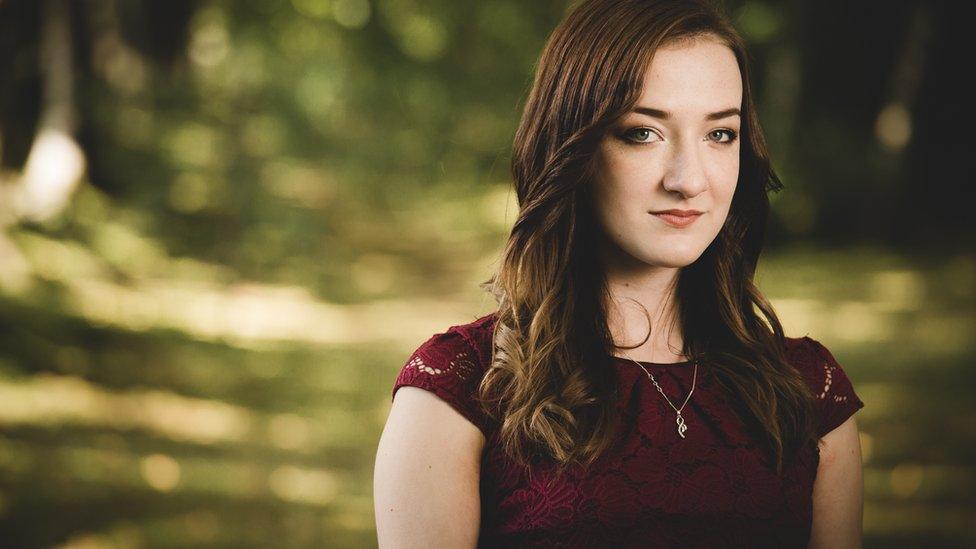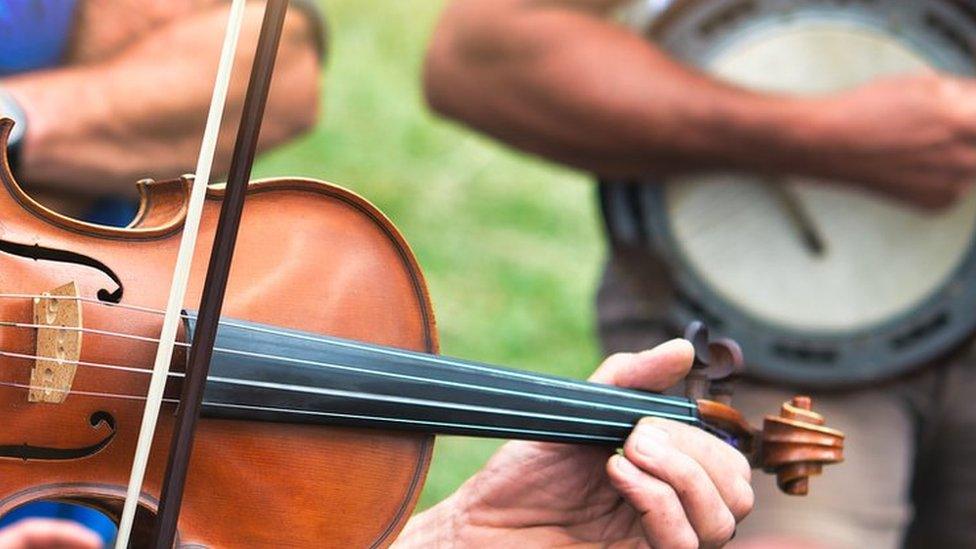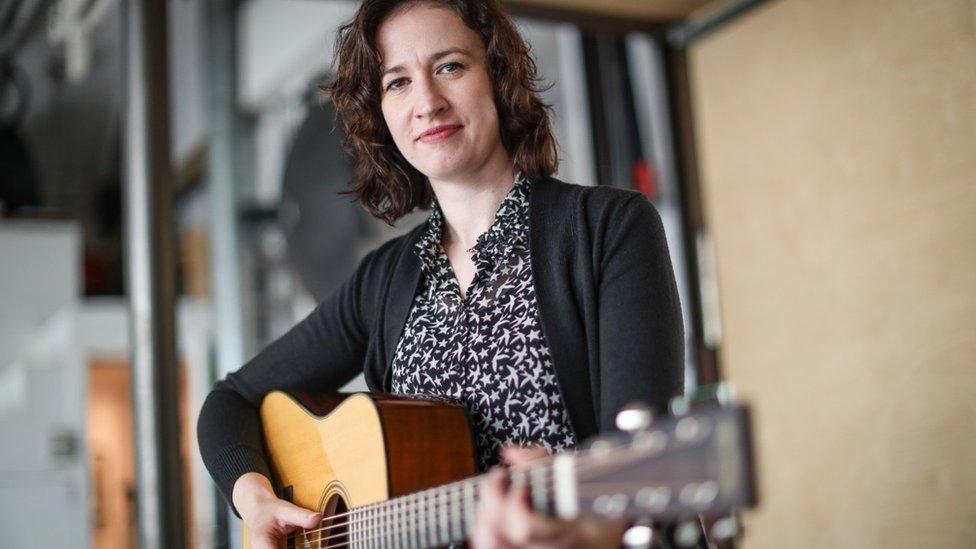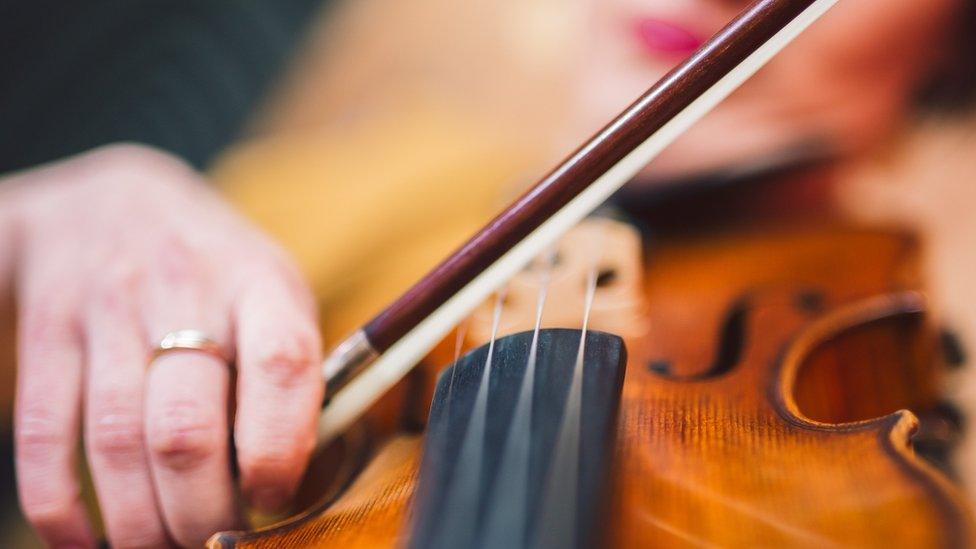Iona Fyfe: Scots traditional singer was 'offered gig help in return for sex'
- Published

Iona Fyfe won Scots Singer of the Year at the Scots Trad Music Awards in 2018
An award-winning traditional Scots singer says she was offered help to get a festival gig in return for sex.
Iona Fyfe, who was named Scots singer of the year in 2018, said she was propositioned by a man from a "really well-known band" when she was 20.
She was able to "laugh in his face" but is concerned others could find themselves in similar risky situations.
Her experience is not unusual in the folk and traditional music community, according to The Bit Collective.
The group has set up a confidential email address, external for people to report instances of sexual harassment, assault and abuse in the industry.
They have learned of a small number of rapes and uncovered widespread "low level disrespect and discrimination" of women.
It comes after Sophie Ellis-Bextor revealed she was raped by an older musician when she was 17.
Iona Fyfe spoke about her experience in an interview with John Beattie on BBC Radio Scotland's Drivetime programme.
She said: "One man from a really well-known band came up to me and said if we're good friends and you do good things what good friends do, then I could maybe look at getting you a slot at a festival.
"Now that in itself is not very nuanced. It was soliciting and... taking advantage of the power balance.
"I was 20 at the time and I really didn't know what to do. My friend saw this and we were all just leaving a venue, and we just left the group and walked home."

The 23-year-old from Aberdeenshire said she did not speak about the incident for some time because she was "so creeped out by it".
"It's really concerning because this could happen to anyone but luckily I was in the position where I could laugh in his face and I left," she said.
But she worries that others who are keen to progress in the industry could be vulnerable to exploitation.
"It's hard enough to be taken seriously as a young woman in the folk scene, let alone when this kind of stuff happens," she added.
The singer wants to see "real consequences" for perpetrators of bad behaviour, as well as a wider change to attitudes in folk and traditional music.
"I definitely find that when I'm introduced on stage, I'm introduced as beautiful but the boys are introduced as formidable musicians," she said.
"Those sort of outlook and opinions, that needs to be changed to begin with... there's a lot more to it than some men exploiting some women."

Earlier this week Sophie Ellis-Bextor revealed she was raped by an older musician when she was 17.
Ms Fyfe spoke out after singer Sophie Ellis-Bextor revealed she lost her virginity when she was raped by a 29-year-old guitarist.
"I heard myself saying 'No' and 'I don't want to'," she wrote in her memoir, "but it didn't make any difference".
'Informal, inter-generational'
Another musician, Catriona Hawksworth, is researching gender discrimination and prejudice in Scottish traditional music as part of her masters degree.
She also works with The Bit Collective which was formed to support women and gender minorities in folk music in Scotland.
They have received emails to their confidential support line which shed light on some of the issues younger musicians are facing.
"What we're really seeing in general is grooming or older established musicians using that power they have to coerce younger people into situations they don't want to be in," she said.
"It comes through this really informal, inter-generational way that the traditional music scene is formed - session culture and festivals where you get young people and older people all sort of playing together.
"It's a really beautiful thing but it does mean you've got young and vulnerable people in situations where people are drunk, and sort of late nights, and no supervision."
They know of a "handful" of rapes but the accusations have not been taken to the police, as far as they are aware.
"What we're seeing is an environment where sexism is ok," she said. "We're not getting a huge number of people coming forward saying they have been raped... but what we're really seeing is that sort of disrespect and discrimination at a fairly low and constant level that is really affecting a lot of women and gender minorities."
She said education was needed to ensure everyone understood what constitutes appropriate behaviour and consent, and that young women have the confidence to say "no".
- Published29 August 2020

- Published31 March 2021
